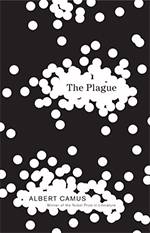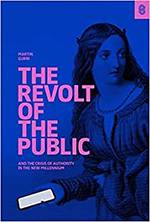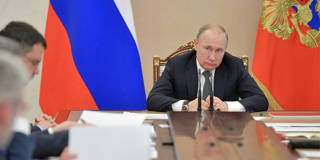Sergei Guriev
Says More…
This week, Project Syndicate talks with Sergei Guriev, a former chief economist of the European Bank for Reconstruction and Development and a professor at Sciences Po in Paris.
Project Syndicate: Last December, you predicted that the reality of ordinary Russians’ “empty refrigerators” would eventually “overwhelm the eternally optimistic messages coming from their televisions and computers, and the foundations of [President Vladimir] Putin’s informational autocracy” would “begin to crumble.” With the COVID-19 crisis having pushed Putin’s approval rating to an all-time low, has the moment of reckoning arrived?
Sergei Guriev: Putin’s low approval ratings do not bode well for his leadership. His recent decision to schedule the constitutional reform vote – essential to reset term limits, thereby enabling him to run for two more six-year terms after 2024 – for July 1 shows that he is well aware of the danger he faces.
The vote was previously planned for April 22, but surging COVID-19 infections forced it to be postponed. Yet Russia hardly has the outbreak under control; the number of daily new infections and deaths in Russia remains high. Nevertheless, Russians will head out to vote in a week.
Guriev recommends
We ask all our Say More contributors to tell our readers about a few books that have impressed them recently. Here are Guriev's picks:
-

The Plague
by Albert Camus
It may not be a particularly original choice during lockdown, but this fictional 1947 account of a plague sweeping the French Algerian city of Oran is worth reading. It reminds us that this is not the first and, unfortunately, probably not the last epidemic humanity will face.
-

Enlightenment Now: The Case for Reason, Science, Humanism and Progress
by Stephen Pinker
Another good book to read (or reread) in difficult times, this fact-based manifesto reassures us that the world is steadily becoming a better place.
-

A Gentleman in Moscow
by Amor Towles
Another work of fiction, this 2016 novel shows how to preserve one’s dignity and sense of humor in very difficult circumstances (such as, say, a lockdown).
-

The Revolt of the Public and the Crisis of Authority in the New Millennium
by Martin Gurri
Given recent developments in the US, now is the time to read (or reread) this 2014 book, which explores the political implications of widespread access to mobile broadband Internet. In fact, Gurri predicted many of the events of the last six years – including Trump’s improbable rise and the Brexit campaign’s success – and has recently released an updated edition examining them. A 2019 paper I wrote with Nikita Melnikov and Ekaterina Zhuravskaya, based on a large global dataset, provides quantitative evidence for Gurri’s main thesis: that digital devices and a vast information sphere can undermine confidence in authorities.
From the PS Archive
From 2014
Guriev tabulates the direct and indirect costs of Russia’s intervention in Ukraine. Read more.
From 2017
Guriev presents a new growth model for Europe’s neighborhood, focused on infrastructure investment, environmental sustainability, and improved governance. Read more.
Around the web
In Sciences Po’s web series Focus, Guriev succinctly explains that democracy must be built tweet by tweet – that is, in the information sphere. Watch the video.
In a live discussion for the Carnegie Endowment, Guriev urges the Kremlin to pursue a more ambitious response to the COVID-19 crisis, including direct payments to all Russian citizens and more aggressive use of Russia’s massive reserves. Watch the video.
